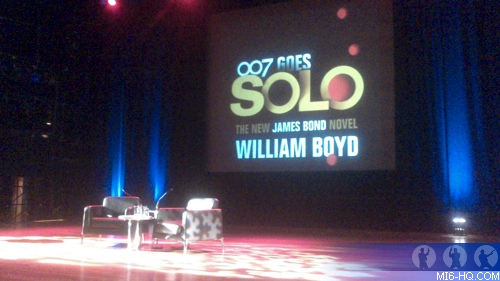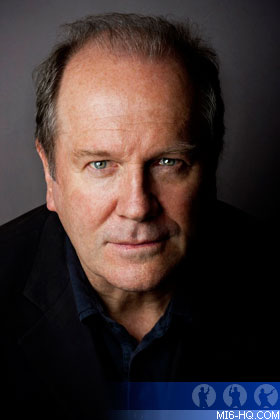Boyd on Bond
27th September 2013
Edward Biddulph reports from the Southbank, where William Boyd answered questions from the crowd about his 007 adventure: 'Solo'
William Boyd has sometimes spoken of the power of the novelist to time-travel, and appropriately, as the Queen Elizabeth Hall in London's Southbank Centre was filling up for last Thursday's 'Boyd on Bond' event, audience members were taken back to the period in which the new Bond novel, "Solo", is set, as songs of 1968 and 1969 played in the background. In a way the music anticipated the conversation that was to follow. If there was a theme to the discussion between Olivia Cole, GQ's literary editor, and William Boyd, author of Solo, it was the legacy of past, and aspects of the past - whether Fleming's, Bond's or Boyd's - were alluded to throughout the evening.
|
The conversation was introduced by Ian Fleming's niece, Lucy Fleming, who spoke about Boyd's encyclopedic knowledge of Bond, and his enthusiasm about the project. Lucy was impressed and thrilled by "Solo", and was sure her uncle would be too, were he looking down - or up - at the various launch events.
Olivia Cole began by revealing how William Boyd had been introduced to Bond at school aged 11. Excited by the descriptions of danger, sex, villainy and sophisticated living, Boyd quickly devoured the series, and remained a fan ever since. Olivia Cole reminded the audience of Bond's own childhood reminiscences, as presented at the start of "On Her Majesty's Secret Service", and this neatly took us on to Boyd's reading of the opening pages of "Solo", in which we learn something of Bond's wartime experiences. To my mind, the tone and style of Boyd's words were uncanny. He could have been reading from the pages of Fleming.
Olivia Cole was intrigued by the description of Bond's war. William Boyd spoke about the clues left by Fleming - the hints of service in France from flashes of Bond's memory - which Boyd ingeniously wove into the realities of Fleming's wartime commando unit. Asked about the novel's late 1960s' setting, Boyd said that he had peppered the novel with references to some of the key events of the time - the Vietnam war, the moon landing, and so on - to evoke a sense of period, and of course Bond could not fail to respond to women in mini skirts and catsuits. When Olivia Cole asked Boyd about what he thought were Fleming's strengths as a writer, Boyd, perhaps surprisingly, spoke about the complexities of Bond's character, which were reflected in his attraction to women 'with a wing down', as Fleming puts it, and Bond's interest in books, including golf manuals, travel, thrillers or poetry. Boyd happily incorporated these aspects into his own novel. Right: Author William Boyd was announced as the next continuation author in April 2012. |
|
Inevitably, William Boyd was asked how he approached the more atrocious traits of Fleming's work - the sexism, racism and homophobia. Even allowing that Fleming was a product of his class and time (and probably would have refuted all charges), these had to go. Bond is not totally a reformed character, however, and continues to smoke and drink excessively.
Inviting questions from the audience, William Boyd regarded the literary and film Bond as separate entities, and was confident that the Bond of the screen had not crept into his book. He enjoyed creating his own characters for the book, especially the villain, more than he enjoyed writing about existing ones, such as M and Moneypenny, and revealed that his favourite Bond book is "From Russia, with Love".
The discussion could have continued for another hour or more, but the book signing beckoned, and Olivia Cole called time on the proceedings. Overall, 'Boyd on Bond' was a thoroughly entertaining and insightful evening, and made me all the more eager to read Bond's adventures in "Solo".
Select Interview Quotes
"Will's knowledge of Bond and my uncle is incredible. The book 'has all the essence of Fleming and more ... a page turner indeed." - Lucy Fleming
"The boys at his prep school used to read [Bond books] aloud to each other in his dorms." - Olivia Cole
The novel opens with a chapter that gives us more insight into Bond's wartime past, which Boyd says he was able to build on from "throwaway lines and half lines" from Fleming's novels.
"I came to Fleming through my enthusiasm for Evelyn Waugh…Fleming and Waugh had something in common - men in a hurry to die" - William Boyd.
"I'm definitely not Bond... you use your imagination, if it functions well you can become someone else. I've never killed a man although I've killed countless people in my novels." - William Boyd
Bond does change somewhat in his attitude in "Solo", but Boyd was quick to point out that these changes simply reflect an older Bond in a changing society. "His attitudes would have changed to a degree. You couldn't have stuck in a rut living in Chelsea in the 1960s," Boyd said.
Boyd was also keen to stress the difference between the film Bond and the literary Bond. "I want to keep this gap between film Bond and literary Bond," he said. "I wanted to write a realistic novel about a real person, I didn't want to write an implausible spy caper."
When asked which of the Fleming novels was his favourite, Boyd pronounced "From Russia With Love" as his personal favourite, although he confessed to having a soft spot for "The Man with the Golden Gun", for which he is currently writing an introduction.
Quotes selected and compiled by Ben Williams. Stay tuned to MI6 for a full transcript of the Boyd Q&A. Many thanks to Ben Williams, and Anders Frejdh.









